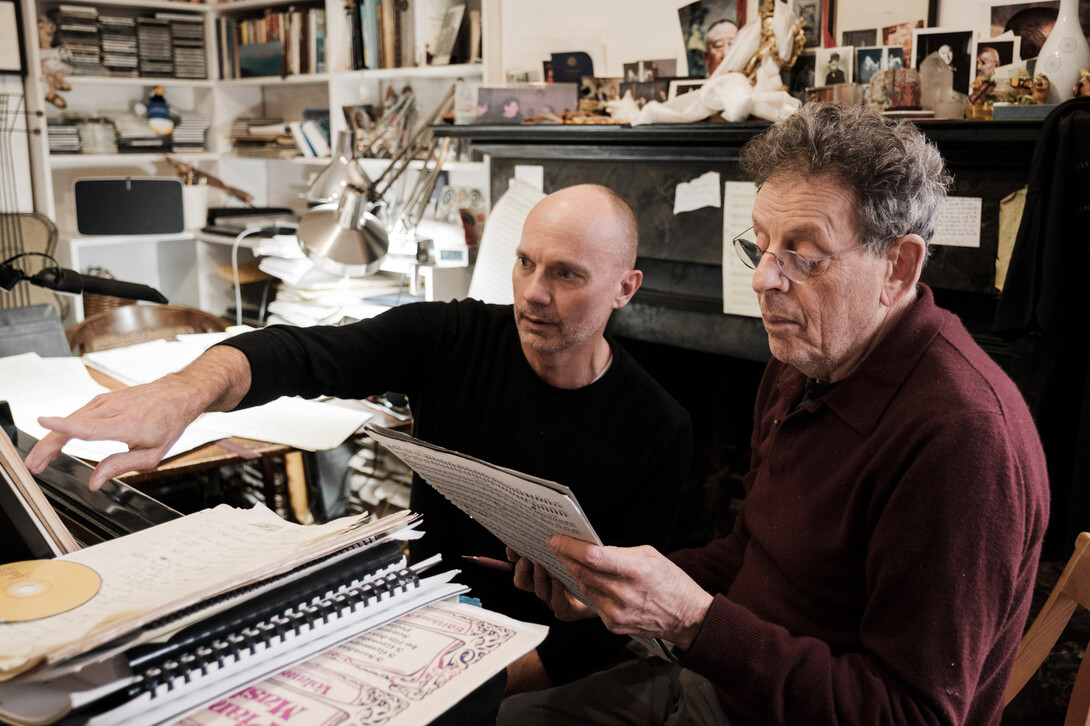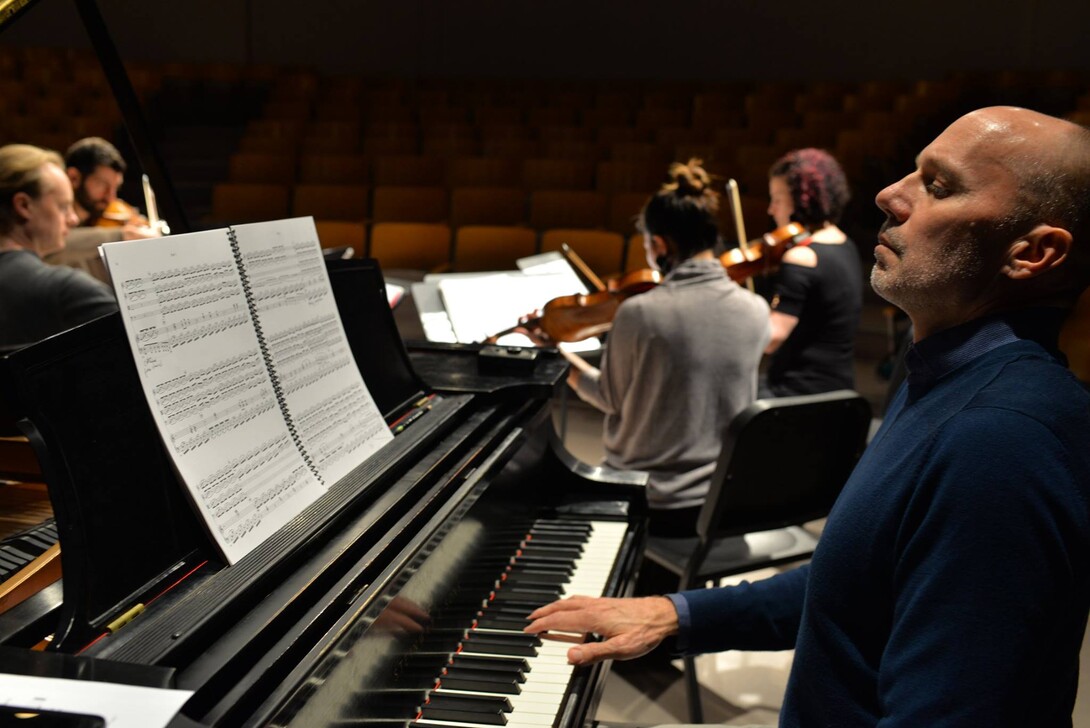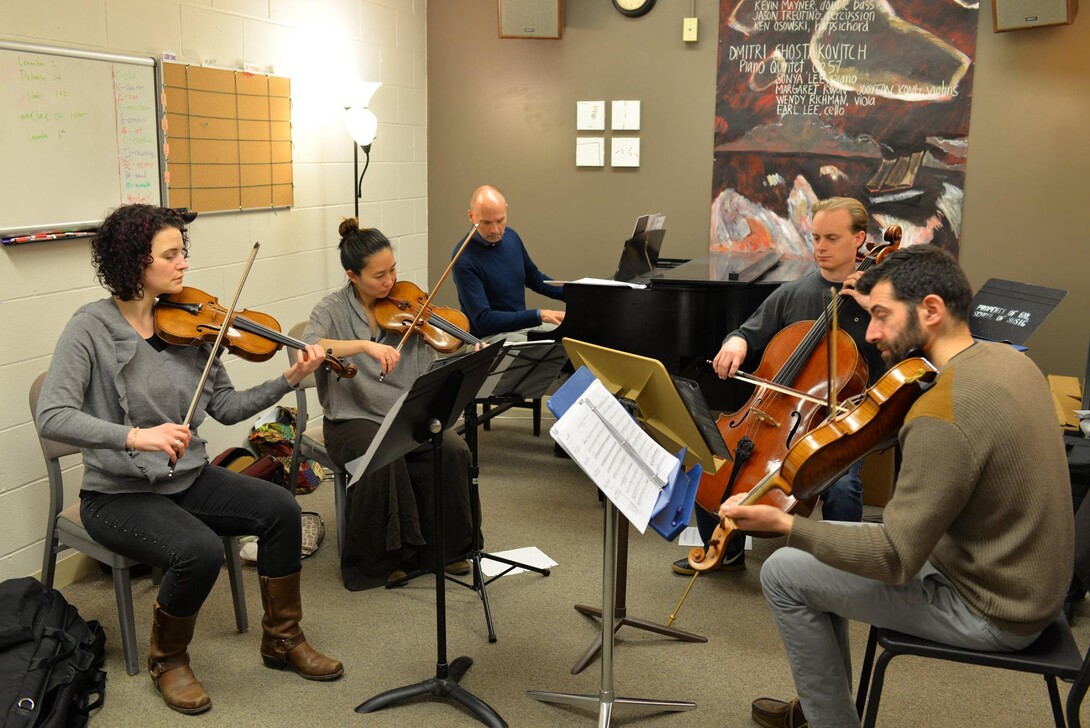
A 24-year friendship between Nebraska’s Paul Barnes and world-renowned composer Philip Glass is bringing a world premiere to the University of Nebraska–Lincoln.
“A Celebration of Philip Glass,” which is April 17 at the Lied Center for Performing Arts, will feature the world premiere of Glass’ new piano quintet “Annunciation.” The quintet, completed by Glass in February, is based on a Greek Orthodox communion hymn for the Feast of Annunciation. It will be performed by Barnes and the Chiara String Quartet.
“This one, special night is going to be the culmination of our entire professional relationship,” said Barnes, Marguerite Scribante Professor of Piano.

“Annunciation” was commissioned by the Pearle Francis Finigan Foundation, Mike and Amber Kutayli, Rhonda Seacrest and the Hixson-Lied College of Fine and Performing Arts.
The concert will also feature the vocal ensemble Cappella Romana performing ancient Byzantine chant and a performance of Glass’s Piano Concerto No. 2 (After Lewis and Clark) featuring Native American flute player Ron Warren and the University of Nebraska–Lincoln Symphony Orchestra, under the direction of Tyler White, professor of music.
Piano Concerto No. 2 had its premiere at the Lied Center in 2004 as part of the Lewis and Clark Bicentennial Celebration.
Also on the program will be Glass’s unpublished piano and violin work “Pendulum” with Hyeyung Yoon and Barnes as well as Glass’s choral work “Father Death Blues” sung by the University Singers under the direction of Peter Eklund, professor of music.
The performance will conclude the tenure of the Chiara String Quartet as Hixson-Lied Artists-in-Residence in the Glenn Korff School of Music. The group will end full-time work performing together in September. Although the members of the group are each planning solo performance and teaching careers moving forward, the group plans to reunite regularly for special projects and performance opportunities.
Glass will attend the concert, as well as two April 16 rehearsals. There will be a dress rehearsal of the piano concerto at 2 p.m. April 16 in Kimball Recital Hall. The event is free and open to the public. That will be followed later by a dress rehearsal for the piano quintet that is open only to Glenn Korff School of Music piano, strings, and composition faculty and students.
“(Glass) has been so generous to me with his time, and the fact that he’s making himself available here in Lincoln — and only in Lincoln — I think that is a wonderful testament to his generosity as a composer and as a musician. It will be great,” Barnes said.

Glass will hear the piece for the first time at the rehearsal on April 16, and Barnes said he and the Chiara Quartet are prepared for any changes.
“Based on our first rehearsal, I don’t think he will have to do any major revisions,” Barnes said. “But you never know. It’s his first time hearing it, and he’s a very creative guy, so he may come up with all kinds of interesting ideas, and yes, we are ready to implement anything for the world premiere the next day. It’s exciting, isn’t it?”
Glass has composed more than 20 operas, large and small; more than 10 symphonies; two piano concertos and concertos for violin, piano, timpani and saxophone quartet and orchestra; soundtracks to films; string quartets; a growing body of work for solo piano and organ. He presents lectures, workshops, and solo keyboard performances around the world, and continues to appear regularly with the Philip Glass Ensemble. He has been nominated three times for the Academy Award for Best Original Score for “Kundun” (1997), “The Hours” (2002) and “Notes on a Scandal” (2006).
Barnes has been collaborating with Glass since they first met in 1995, and Barnes said “Annunciation” has its origins in one of their earliest conversations.
“I remember hearing the score that he wrote to the Martin Scorsese film, ‘Kundun,’” he said. “It didn’t win, but I still remember the opening of that, and it starts out with this giant drone, and I immediately thought, ‘Oh my God, that sounds like Byzantine chant,’ and so he and I had this conversation about the relationship between the Buddhist and byzantine chant. This piano quintet is the musical outcome of that conversation.”
Barnes also serves as head chanter at Annunciation Greek Orthodox Church in Lincoln.
“Annunciation” is in two parts. From the program notes, “Part One opens with a meditative chromatic chord progression, which eventually leads to the first entrance of the chant first stated in the piano… Part Two is a poignant musical meditation on Part One, revealing Glass’s innate ability to connect the transcendental ethos of the original chant with his own spacious approach to musical time.”
“It’s so interesting what he does with the second part because there’s no direct quotation from the chant, but he takes an idea that he developed in the first movement derived from the first three notes of the chant, and then uses that as the basis for this very meditative, slow second movement all the way through,” Barnes said. “And there’s some very interesting things rhythmically that I’ve never seen him do before and some unbelievably beautiful chords as well. The piece ends with a virtuoso coda that’s going to be a lot of fun to play.”
Barnes retains exclusive rights to the piece for two years following the premiere.
Following the premiere, Barnes and the Chiara String Quartet will be performing the piece in Hartford, Connecticut, on April 22 and then New York City on May 12 at the Metropolitan Museum of Art. Glass will only be attending the Lincoln premiere.
“Philip Glass will be right there in the front row,” he said. “It’s such an eclectic night having Cappella Romana here, so you have the world’s authority on Byzantine chant with Alexander Lingas, the director, and they will be singing the actual hymn upon which Philip based the Quintet. And those in the audience will be the first humans to hear a performance of the quintet. And then for those Nebraskans who remember the Lewis and Clark concerto 14 years ago, it’s the culmination of 24 years of working with this amazing composer. Who wouldn’t want to be there for that?”







